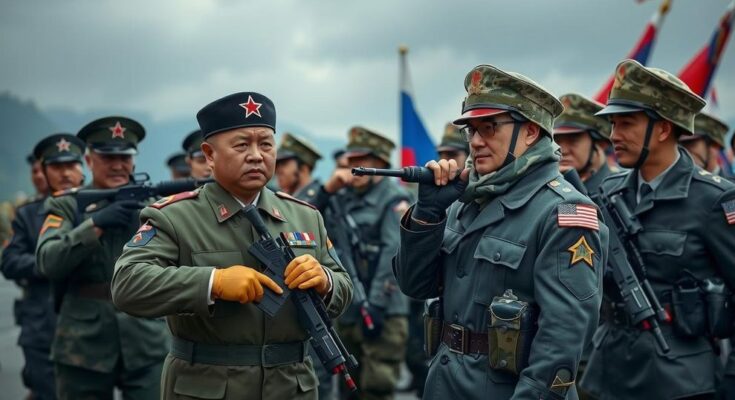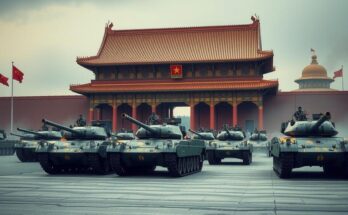North Korea’s deployment of over 10,000 troops to Russia to aid in the Ukraine conflict has pressured Chinese President Xi Jinping to intervene diplomatically. World leaders at recent summits urged Xi to curb North Korea’s military collaboration, which poses risks to regional stability. Despite external pressures, China remains cautious in addressing the issue, opting for a strategy that maintains its relationships with both North Korea and Russia while balancing its ties with the West.
Recent developments regarding North Korea’s troop deployment to Russia have emerged as a source of concern for Chinese President Xi Jinping, as several key trading allies have urged him to exert pressure on Pyongyang to halt or reverse its military contributions to Russia’s efforts in Ukraine. Reports indicate that over 10,000 North Korean soldiers have joined the conflict, an escalation that has placed Xi in a precarious position as he navigates relations between Russia and the West.
During joint press engagements with leaders from Brazil and Peru, Xi expressed a desire for increased dialogue and negotiation regarding the situation in Ukraine. Nonetheless, attendees at both the G20 summit in Rio de Janeiro and APEC summit in Lima underscored the necessity for China to moderate North Korea’s military activities. Notably, leaders including German Chancellor Olaf Scholz and South Korean President Yoon Suk Yeol voiced concerns, suggesting that North Korea’s military collaboration with Russia constituted a serious threat to regional stability.
Despite international pressure, China has refrained from publicly rebuking North Korea for its troop deployment, a strategic choice that reflects Beijing’s unwillingness to alienate either of its neighboring allies. Experts suggest that this approach enables China to maintain flexibility in its foreign relations while avoiding direct confrontation. However, the increasing military partnership between North Korea and Russia raises alarms regarding potential ramifications for China’s security considerations.
Commentators indicate that Xi is caught in a balancing act, wary of the implications of North Korean actions on Chinese domestic stability while striving to mitigate potential U.S. hostility. This complicated dynamic is further exacerbated by the evolving geopolitical landscape, where China seeks to avert any fallout from its economic ties to both North Korea and Russia while appeasing global powers such as the United States.
The reluctance to confront Moscow or Pyongyang about troop numbers is evidenced by public statements from Chinese officials, emphasizing Beijing’s consistent policy toward Ukraine and the Korean Peninsula. This consistency is, however, juxtaposed with allegations that China supplies dual-use goods to support Russia’s endeavors, a charge that could evoke significant geopolitical repercussions. Ultimately, experts assert that Beijing’s careful navigation of its relationships is indicative of its broader strategy to avoid provoking either regional power.
China’s leadership, while silent on the troop deployments, is increasingly aware of the potential backlash from Western nations should it be perceived as complicit in North Korea’s military engagements. The complex interplay between supporting Russia’s war efforts and maintaining diplomatic relations with the U.S. and its allies exemplifies the intricacies of international diplomacy in a multipolar world. As the situation continues to evolve, it is clear that North Korea’s actions not only complicate its relationship with China but also affect China’s broader strategic positioning in global politics.
The article outlines the challenges faced by China as it attempts to balance its relationships with North Korea and Russia amid increasing international pressure regarding military cooperation linked to the Ukraine conflict. With significant troop deployments from North Korea to Russia, concerns arise about escalating tensions and the potential for increased U.S.-China confrontations. Additionally, the nuanced position of China in this geopolitical landscape exemplifies the complexities of maintaining stability while navigating pressures from both its allies and adversaries.
In conclusion, the dynamics of North Korea’s troop deployment to Russia present a significant challenge for China as it strives to manage its geopolitical relationships amidst rising tensions. While Xi Jinping faces calls to influence North Korea’s actions, his reluctance to alienate either Pyongyang or Moscow underscores the intricacies of modern diplomacy. As the international community continues to scrutinize this developing situation, the implications of these military alliances will likely shape not only regional dynamics but also global power structures.
Original Source: www.voanews.com




